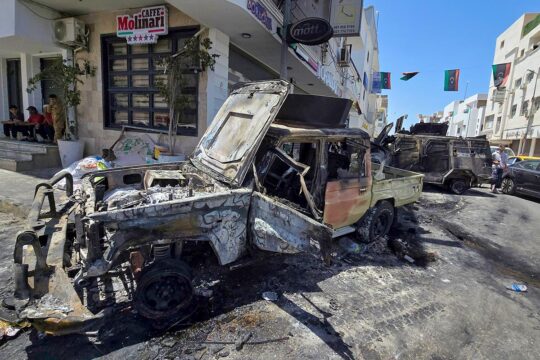Khalifa Haftar, who on Tuesday announced his bid to become president of Libya, has spent much of the past decade leading military campaigns but now seeks power through the ballot box after a humiliating defeat at the gates of Tripoli.
The field marshal, whose white hair contrasts with a dark moustache and eyebrows, has been a controversial but key player in Libya since it spiralled into chaos with the revolt against longtime dictator Moamer Kadhafi in 2011.
A month after the revolt began, Haftar returned from two decades of exile in the United States, basing himself in the eastern city of Benghazi.
That October, Kadhafi was tortured and killed by rebels.
Shortly afterwards, some 150 army officers proclaimed Haftar their chief of staff.
Since then, he has consistently presented himself as the man to save Libya from "terrorists and mercenaries".
In 2014, his self-styled Libyan National Army launched a blistering campaign against jihadist groups in Benghazi.
After declaring victory in 2017, he moved to kick hardline groups out of Derna, the only town in the eastern region of Cyrenaica still holding out against his forces.
Those victories established him as a key player in a country now mired in a complex war between multiple militias backed by foreign players.
Haftar was not averse to seeking outside support himself.
With backing from Russia as well as the United Arab Emirates and Egypt, in 2019 he sent his forces to the country's desert south, taking the main city Sebha without a fight.
He then turned his sights on the capital Tripoli, on the western end of Libya's Mediterranean coast, vowing to "cleanse" the capital of "terrorists" backing the internationally recognised Government of National Accord.
But despite a rapid initial advance, Haftar's forces became bogged down on the southern outskirts of the capital, and an intervention by Turkey helped pro-GNA forces drive him into a bruising retreat in June 2020.
- 'Glory, progress, prosperity' -
Yet defeat on the battlefield did not spell the end of the 77-year-old's political ambitions.
An October 2020 ceasefire and a United Nations-backed peace process paved the way for December elections in which Haftar was always expected to stand.
Announcing his candidacy on Tuesday, he said he wanted to be president "not because I am chasing power, but because I want to lead our people towards glory, progress and prosperity".
But he remains a deeply divisive figure, accused by rivals in western Libya of war crimes and of trying to install himself as a new dictator.
Haftar started his career as a Soviet-trained soldier and took part in the 1969 coup that toppled Libya's pro-Western monarchy and brought Kadhafi to power.
Haftar, once a military chief under Kadhafi, was taken prisoner in the border area of Ouadi Doum during Libya's 1978-1987 war with Chad.
But Kadhafi disowned him, saying the general was not part of his army.
Haftar's foes mockingly called their counter-offensive against Haftar's 2019 assault on Tripoli "Ouadi Doum 2".
Washington managed to orchestrate his release, granting him asylum in the United States where he joined the Libyan opposition.
In a historic irony, Haftar's main rival at the ballot box will be Kadhafi's son Seif al-Islam, who registered his candidacy on Sunday.
But many questions remain over whether the vote will go ahead, whether the result will be respected or whether the winner will be able to bring stability to a country torn apart by a decade of conflict.


